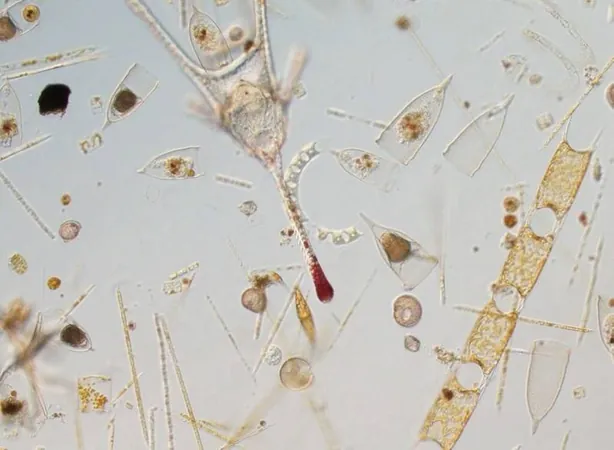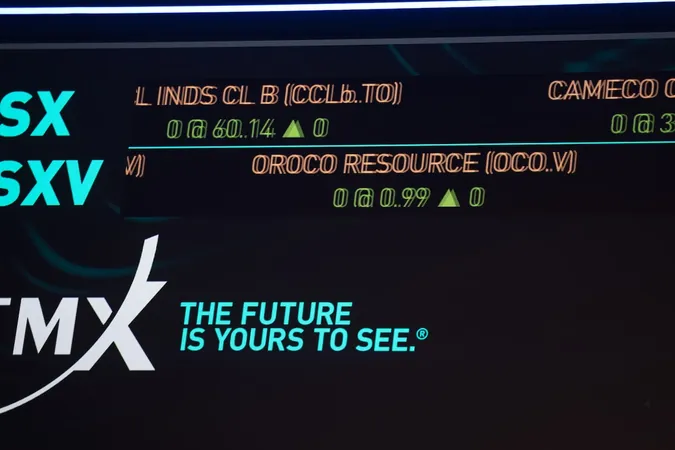
Unlocking the Secrets of Plankton: A Game-Changer for Climate Models!
2025-07-01
Author: Amelia
An eye-opening study led by the Plymouth Marine Laboratory reveals that enhancing our understanding of plankton is essential for tackling the pressing challenges posed by global climate change.
Plankton: The Tiny Titans of Our Ocean's Ecosystem
While they may be microscopic, plankton are the backbone of marine life and essential for global biogeochemical cycles. However, current models that simulate their impact on ocean ecosystems lag far behind the latest scientific insights, according to the groundbreaking findings published in the journal *Nature Ecology & Evolution*.
Why Current Plankton Models Are Falling Short
The research team, featuring over 30 international experts, warns that plankton models, which are vital for everything from fishery management to climate projections, need urgent updating. Professor Kevin Flynn from PML emphasizes that without proper modeling, we can't accurately predict our marine future.
The Vital Role of Plankton
"No plankton means no fish, sharks, whales, or seals," Flynn states. These microscopic organisms not only serve as the foundation of the oceanic food chain but are also critical in oxygen production and carbon dioxide fixation, much like plants on land. Their biodiversity plays a pivotal role that cannot be condensed into a few model categories.
A Call for Change: Upgrading Our Simulation Tools
The authors of the paper assert that using outdated simulation tools from the last 30 to 50 years poses a serious problem. This disconnect threatens to misrepresent changes in biodiversity and marine productivity. Relying on overly simplified models can lead to misleading conclusions and a false sense of security in making predictions.
Revolutionizing Plankton Research: Key Recommendations
To rectify these issues, the paper outlines several crucial recommendations:
1. **Enhanced Collaboration:** Encourage closer partnerships between empirical scientists and modelers, especially during the creation of models.
2. **Complexity in Design:** Integrate real-world ecological complexities into the framework of core models.
3. **Access to Modeling Tools:** Implement new platforms that allow non-coding scientists to contribute to model development.
4. **Investment in 'Digital Twins':** Develop advanced models that can simulate realistic biological processes and provide data-driven insights for decision-making amidst global changes.
A New Era in Plankton Ecology
The authors urge the scientific community to elevate modeling to the forefront of plankton research, much like how molecular biology transformed scientific approaches in the past. This transition is vital for a comprehensive understanding of how our oceans will respond to climate change.
This pivotal research received support from the UK's Natural Environment Research Council, aligning with the UN Decade of Ocean Science and the Digital Twins of the Ocean initiative.









 Brasil (PT)
Brasil (PT)
 Canada (EN)
Canada (EN)
 Chile (ES)
Chile (ES)
 Česko (CS)
Česko (CS)
 대한민국 (KO)
대한민국 (KO)
 España (ES)
España (ES)
 France (FR)
France (FR)
 Hong Kong (EN)
Hong Kong (EN)
 Italia (IT)
Italia (IT)
 日本 (JA)
日本 (JA)
 Magyarország (HU)
Magyarország (HU)
 Norge (NO)
Norge (NO)
 Polska (PL)
Polska (PL)
 Schweiz (DE)
Schweiz (DE)
 Singapore (EN)
Singapore (EN)
 Sverige (SV)
Sverige (SV)
 Suomi (FI)
Suomi (FI)
 Türkiye (TR)
Türkiye (TR)
 الإمارات العربية المتحدة (AR)
الإمارات العربية المتحدة (AR)